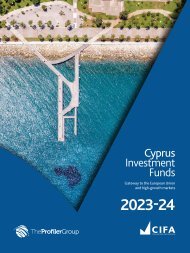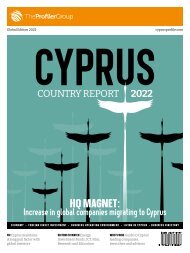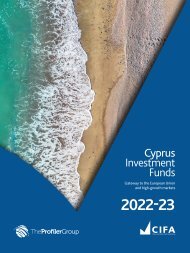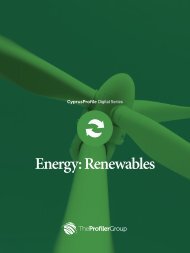2020 Cyprus Country Report
The 2020 Cyprus Country Report features in-depth articles on the economy, foreign direct investment, international trade and headquartering as well as detailed sector profiles and insights from Cyprus’ 100 most influential political, economic and business leaders shaping the future of their country and its industries.
The 2020 Cyprus Country Report features in-depth articles on the economy, foreign direct investment, international trade and headquartering as well as detailed sector profiles and insights from Cyprus’ 100 most influential political, economic and business leaders shaping the future of their country and its industries.
Create successful ePaper yourself
Turn your PDF publications into a flip-book with our unique Google optimized e-Paper software.
Renewables have<br />
the potential to<br />
create between<br />
11,000 and<br />
22,000 jobs<br />
in <strong>Cyprus</strong> by 2030<br />
The <strong>Cyprus</strong> Institute’s PROTEAS Facility in Pentkomo<br />
<strong>Cyprus</strong> has the highest potential for solar<br />
power of any European Union country, and the<br />
island is already one of the highest users per capita<br />
in the world of solar water heaters in households,<br />
with over 90% of households equipped with solar<br />
water heaters and over 50% of hotels using large<br />
systems of this kind.<br />
<strong>Cyprus</strong> submitted its final National Energy<br />
and Climate Plan (NECP) for the period 2021-<br />
2030 to the European Commission in January<br />
<strong>2020</strong>. Among other things, its 10-year roadmap<br />
and 2030 targets focus on for example the implementation<br />
of a more sustainable transport sector<br />
through electric cars and on further promoting<br />
the use of RES in electricity production. It also<br />
proposes a 23% share of energy from renewable<br />
sources in gross final consumption of energy in<br />
2030. According to the €1.3 billion roadmap,<br />
<strong>Cyprus</strong> plans to reduce greenhouse gases by an<br />
ambitious 24%.<br />
Energy is one of <strong>Cyprus</strong>’<br />
most promising sectors,<br />
with a number of<br />
investment opportunities<br />
in new and existing<br />
projects. Regarding<br />
renewables and electricity<br />
production, we are<br />
focusing our efforts on<br />
the operation of a fully<br />
competitive electricity<br />
market by the end of<br />
2021, whilst also making<br />
concrete steps to end<br />
our country’s energy<br />
isolation and moving<br />
towards green energy<br />
and storage installations.<br />
The Ministry also plans to<br />
create a One-Stop Centre<br />
for commercial renewable<br />
energy projects, as<br />
well as to facilitate the<br />
construction of the<br />
projects proposed in the<br />
framework of our last two<br />
funding schemes – 222<br />
commercial RES projects<br />
in total. In addition, we<br />
are funding households<br />
and businesses for<br />
energy efficiency and<br />
the installation of<br />
photovoltaics and other<br />
RES systems for netmetering,<br />
net-billing<br />
and self-consumption.<br />
Natasa Pilides<br />
Minister of Energy,<br />
Commerce and Industry<br />
SUPPORTING RES SYSTEMS<br />
<strong>Cyprus</strong> currently operates a scheme for the production<br />
of electricity from RES for own use,<br />
which includes installations of net-metering<br />
photovoltaic (PV) systems with capacity up to 10<br />
kW for all consumers, net-billing RES systems<br />
(mainly PV and Biomass) with a capacity up to<br />
10 ΜW for commercial and industrial consumers,<br />
and off-grid RES systems with no limit in<br />
total capacity. For the installation of net-metering<br />
PVs in households, the government is offering<br />
subsidies intended to encourage further RES installations<br />
by reducing the recuperation period of<br />
their investments.<br />
In addition, two successful support schemes<br />
for the installation of RES systems that will<br />
operate in the competitive electricity market<br />
have been implemented in the period 2017-<br />
2019. In the first scheme 114.5 MW PV systems,<br />
2.3 MW Biomass systems and 12.5 MW from<br />
a wind park have been approved, and in the<br />
second scheme 259 MW from PV parks. The<br />
RES systems that enter these schemes are expected<br />
to be operational before the end of 2021.<br />
<strong>Cyprus</strong>’ energy policy has created financial<br />
support for RES projects, and a special fund<br />
was created aiming to support RES and energy<br />
saving investments in <strong>Cyprus</strong>, with revenue<br />
derived from consumers paying a ‘green tax’<br />
levied on electricity bills (currently at €0.005<br />
per kWh and €0.0025 per kWh for vulnerable<br />
groups).<br />
The country’s national grid system needs<br />
upgrading as it has certain intrinsic and technical<br />
limitations affecting RES penetration and<br />
reliability. However, studies by the International<br />
Renewables Agency (IRENA) concluded that<br />
using the existing system, renewable energy<br />
and mostly solar, could provide 25% to 40% of<br />
<strong>Cyprus</strong>’ total electricity supply in 2030 and bring<br />
costs down significantly. This can be increased<br />
further by implementing RES installations with<br />
storage capability through competitive bidding.<br />
The country is also exploring ways to introduce<br />
smart grids in the national network and is<br />
on the look-out for projects that could facilitate<br />
energy storage, and ventures that have production<br />
on a 24-hour basis. In addition, the prospective<br />
EuroAsia and EuroAfrica Interconnectors<br />
could bring more solutions down the pipeline.<br />
FOSSIL FUEL RELIANCE<br />
A key challenge for <strong>Cyprus</strong> is its high dependency<br />
on fossil fuels for energy – with the biggest<br />
share within the EU. This makes it crucial for<br />
the country to develop both its natural gas, the<br />
cleanest of the fossil fuels, and renewable energy<br />
Sector Profile<br />
<strong>Country</strong> <strong>Report</strong> CYPRUS <strong>2020</strong> 85

















